IN honour of International Women Day on March 8 the Women and Gender Equality Commission launched an exhibition to highlight the lives and accomplishments of remarkable women both local and international, at the Parliament Chamabers last Wednesday. The exhibition showcases twelve women, seven of whom are from Guyana’s shores.
DESIREE BERNARD
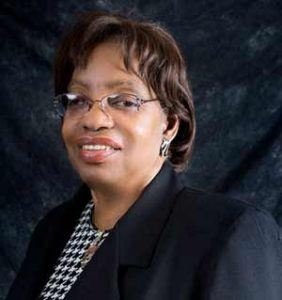
The Honourable Madam Justice Desiree Bernard is the first female to hold many illustrious positions.
In 1980 she was appointed the first female judge in the High Court of the Supreme Court of Guyana, where she had practiced since 1965.
In 1992, she was appointed the first female Justice of Appeal in the Court of Appeal of the Supreme Court of Guyana; in 1996, the first female Chief Justice; in 2001, the first female Chancellor of the Judiciary of Guyana and the Caribbean and in 2005, the first female Judge of the Caribbean Court of Justice.
Her illustrious career has been studded with appointments to distinguished posts, nationally, regionally and internationally. She has served as a member of the United Nations Committee on the Elimination of Discrimination Against Women (CEDAW), the International Association of Women Judges and as Vice President of the International Federation of Women Lawyers. Regionally – a member of the Caribbean Council of Legal Education, President of the Organisation of the Commonwealth Caribbean Bar Associations.
She has been at the forefront in the formation of the Caribbean Women’s Association, the Georgetown Toastmistress Club, the Conference on the Affairs and Status of Women in Guyana (CASWIG), Guyana Consumer’s Association and the Guyana Association of Women Lawyers.
In the area of volunteerism, she was the first female Chancellor of the Anglican Diocese of Guyana (and the first in the Province of the West Indies) as well as a member of the Guyana Girl Guides Association’s Board of Trustees.
She has penned papers on gender and legal issues including “Confronting Gender-Based Violence in the Caribbean” which will be included in a forthcoming publication edited by Prof. Kenneth Hall and Myrtle Chuck-A-Sang, titled “The Caribbean Integration Process, A People Centred Approach”.
Her nine awards include the Medal of Service from the Caribbean Women’s Association and the Order of Roraima of Guyana, the second highest national award of Guyana and now, the 2005 CARICOM Triennial Award for Women.
LYLA KISSOON
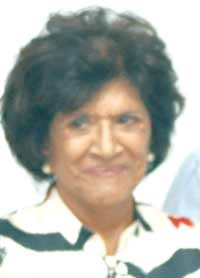
Lyla Kissoon has over 50 years experience at the helm of one of the largest and most enduring businesses in the country.
Born Lyla Sankar on February 19, 1930, in Nickerie, Dutch Guiana to Amin and Zohora Sankar, she was the second of eight children.
At the age of eight, Lyla and her older sister Amna came to Guyana with their father where his very first task was to get them both into Bishops’ High which at the time was the best all-girls school in the country. After Bishops’ High School, she abandoned her ambition of becoming a doctor to work at her father’s hardware store on Water Street when she was 18 –years old.
She soon met and married Alston Kissoon, and they decided to go into business for themselves, on the lot that is now home to Republic Bank at Camp and Robb Streets, they opened a dry goods store on December 9, 1951. One day in 1955, while on a trip to New York to buy stock for the business, Alston visited a furniture plant. He was so impressed by what he saw that he came home and convinced Lyla that their next venture would be to open up a furniture factory here.
The couple brought in experts to teach them and their staff about the operations; they then combined these with the tried and true techniques of local craftsmen to produce their furniture. A. H. & L. Kissoon was one of the first to start offering Hire Purchase in those days.
On January 8, 1966, Alston Kissoon was convinced by a friend in the government to attend a trade fair in India. On January 24, he changed his flight from British Overseas Airways Corporation (BOAC) to Air India because the British flight was running late and he wanted to get home to his family. Early in the morning of January 24, 1966, Air India flight 101 crashed into Mont Blanc in France killing all 117 persons on board.
Widowed at thirty-five, she refused to fade away into protracted mourning. Three months after the loss of her husband she was meeting the Queen in Georgetown during Guyana’s independence celebrations wearing a sari – the first one she had ever worn – bought by her husband in India and sent to her specifically for the occasion before his ill-fated flight. Her celebrity status was consolidated during the post- independence years, partially on account of her singular prominence as a businesswoman managing considerable assets and equally on account of her appearance at almost every occasion of national import.
She took charge of the business and with the partnership and support of Hemraj Kissoon, a relative of her husband who had been with them since 1952, the Kissoon Group of Companies rose to even greater heights.
Eventually marrying Hemraj, she managed every single aspect of the businesses, she learned the work from the bottom up over the years, she was a secretary, a bookkeeper, a typist, an accountant, a supervisor, a manager and the list goes on and on.
Lyla was also involved in charitable and service organisations too numerous to mention over the many years that she worked full-time. One of her favourite efforts was that of establishing the Guyana Cancer Society almost four decades ago. In 1988, she was awarded the Golden Arrow of Achievement by President Desmond Hoyte for whom she worked as an adviser.
MARILYN DEWAR

Legendary local pianist Marilyn Dewar is a sought after music teacher in Guyana.
An accomplished pianist from the age of three, Marilyn Dewar also plays the cello, organ, violin, recorder, and sings as well. She is an accompaniment with the renowned Woodside Choir and Secretary of the Music Teachers’ Association of Guyana for the last twenty years. She is also one of the founding members of the Broadcast to Schools programme.
By age 11, she had moved on to the violin with Mr. Francis Percival Loncke, writer of the National Song “My Guyana Eldorado.” Wanting to accomplish more, she then learned to play the cello under the watchful eyes of Mr. John Bumbury.
Soon she was one of the youngest members of the National Symphony and Princeville Orchestras and was playing her violin at events all over the country.
Recognising her exceptional musical abilities, her mother encouraged her to begin playing the organ when she was about 12 years old .This saw her going to the Trinity Methodist Church to learn from the esteemed Winslow Smith.
A short time later, organist of Christ Church where Marilyn attend, Chapman Edwards died and she was granted a scholarship in his name to play the organ at the church and further her studies in this area.
By her mid-teens she was the Deputy Organist at the church and playing at all the services. Marilyn attended the Fountain AME Primary in New Garden Street and St Cambridge Academy on South Road.
On attaining her certificate from the Teachers’ Training College she taught music at Queens College, Bishops’ High and Charlestown. She was then seconded to work with the Broadcast to Schools Programme where she single handedly coordinated and conducted the programme for close to ten years. While there she was awarded a British Council scholarship to the BBC which afforded her an opportunity to work at Tavistock House in London.
Recalling this tenure, she noted that it showcased Guyanese’ prowess at multi-tasking.
In 1973, while still with the Broadcast to Schools programme she met her husband David to whom she has been married for the last 36 years.
She is also on a mission to revitalise what she sees as “the waning of music in Guyana”. Teaching students to play the piano has been her major focus for the last thirty years and while it is done primarily out of love for the music genre.
She has taught thousands of prestigious persons and she currently works six days per week until very late into the evenings sometimes. She advocates the need for music to return to the curriculum of public schools.
As another way of keeping music alive, Marilyn has been instrumental in resuscitating the Guyana Music Festival this April which has not been held since 1997. The festival which began in 1952 allows musicians of all genres to showcase their talent by competing in a number of areas.
SISTER MARY NOEL MENEZES
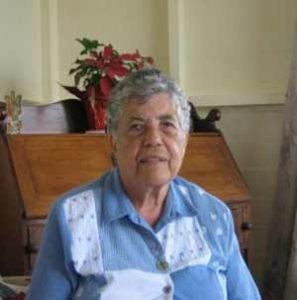
Sister Mary Noel Menezes respectfully and affectionately called “Sister” or “Sister Noel” by those who know her, was awarded an honorary degree of Doctor of Laws (LL.D). She was the only female among a small select group of four eminent Caribbean nationals who were awarded honorary doctoral degrees by the Region’s premier educational institution.
Whereas the other three awardees, namely Professor Raymond Gosling, a scientist, Justice Joseph Archibald and Mr. Tajmool Hosein, a legal luminary, were honoured for their academic/professional achievements, Sister Menezes’ award was in recognition of both her academic accomplishments as a professional historian and her altruism. At a special luncheon in honour of the four Honorary Graduants, the host, Dr. Bhoendradatt Tiwari, the Pro vice-chancellor and Campus Principal, commended her for being a rarity in today’s increasingly materialistic world by being a scholar who was a genuine philanthropist.
Most of Sister Menezes’ life as an academic was spent at the University of Guyana. After teaching for two years at colleges in the United States of America in the mid-1960s, she joined the U.G staff in September 1967 and served there until her retirement 23 years later in 1990. During this lengthy period she had numerous academic achievements.
Among them was the enviable reputation that she gained, as being one of the institutions most stimulating and engrossing teachers. Moreover, Sister-an efficient, creative, fearless administrator, served as head of the Department of History for nine years (1977-1986), transforming this hitherto humdrum department into one of the finest departments in the entire university.
Furthermore, in 1973 she initiated the university’s first Master’s Degree Programme – a M.A. in Guyanese and West Indian History. She served as the Chief Co-ordinator of this programme for 17 years, from its inception to her retirement in 1990.
In that capacity she trained a new generation of professional Guyanese historians. Some of them, notably Dr. James Rose and Dr. David Chanderbali, respectively the current vice-chancellor and Registrar, Mr. Tota Mangar, the Dean of the School of Education and Humanities, and Ms. Cecelia Mc Almont, the Head of the Department of Social Studies, are still serving the university. Others, including Dr. Basdeo Mangru, the university’s first Master’s graduate, Dr. Marguerite Chase-Garvey and Dr. Kimani Nehusi, are pursuing successful academic careers overseas.
Sister Menezes was one of University of Guyana’s (UG) leading researchers and most prolific writers. Her research greatly enhanced knowledge especially of two areas in Guyanese history in which she became the recognised authority. These areas are the history of the Amerindians, the subject of her doctoral dissertation at the University of London in England from 1970 to 1973, and the history of the Portuguese.
She produced four books on these two subjects, namely, British Policy Towards the Amerindians in British Guiana, 1803-1873 (Oxford: Clarendon Press, 1977); The Amerindians in Guyana 1803-1873. A Documentary History (London: Frank Cass and Co. Ltd., 1979); Scenes from the History of the Portuguese in Guyana (London: The Author, 1986); and the Portuguese of Guyana: A Study in Culture and Conflict (Gujarat: The Anand Press, 1992).
Two other of her numerous publications are particularly cherished by students. Her book, The Amerindians and the Europeans is one of the most informative sources of knowledge for this popular theme in the Caribbean Examinations Council (CXC) Caribbean History syllabus. Secondly, her Guide to Historical Research, later revised with a new title, How to Do Better Research, continues to be an invaluable guide especially to university students in all disciplines on research methodology.
Sister Menezes’ growing stature as a historian received special recognition on three occasions in the late 1970s and early 1980s. The first occasion was in 1978 when she became the first female president of the Association of Caribbean Historians, the regional body of historians founded in 1968. She served in that capacity for two years. Secondly, in 1980 she was promoted to the position of Professor of History at U.G., the first holder of this post. Finally, in 1981, she was appointed a member of the Drafting Committee of UNESCO’s General History of the Caribbean.
At her retirement from U.G. in 1990 Sister Menezes was honoured in a touching public ceremony on campus, the first of its kind for a member of the teaching staff in the university’s long history. This was clear evidence of the high esteem in which she was held by the university community.
While recording achievement after achievement as a teacher, administrator, re-searcher and writer, Sister Menezes remarkably found time to be involved in a number of philanthropic activities. As the UWI public orator, Professor Barbara Lalla, stated in the citation for Sister before presenting her to Chancellor Sir George Alleyne to receive her honorary degree last Friday evening, she is “a selfless and effective humanitarian… who rendered phenomenal humanitarian service.”
DIANE MCTURK

Diane McTurk is the visionary behind both the Karanambu Trust and the Karanambu Lodge. The North Rupununi is also her home. She was born at Karanambu soon after her pioneer father, Tiny McTurk, established a cattle ranch there. Tiny was also a naturalist and Diane learned to appreciate the region’s extraordinary flora and fauna at an early age. After attending the Wychwood School in Oxford, England, she moved to London to work in the hospitality business for the Savoy Group.
In 1966, Diane returned to Guyana to celebrate the country’s independence. She subsequently became the Press Officer for The Guyana Sugar Producers Association. She moved back to England briefly and worked in corporate public relations before returning to her Rupununi roots in 1976. Like all the cattle ranches in the area at the time, Karanambu had suffered from a series of misfortunes: epidemics of diseases had decimated the herds, and there were difficulties protecting the cattle from rustlers. As a result, Diane looked for alternatives to make a living. Karanambu was well known for its wildlife and spectacular fishing, and had always been a welcome rest stop for unexpected visitors. So, in 1983, she opened her home to eco-tourists. Diane also offered refuge to injured or orphaned wildlife. Sadly, the animal that appeared most often was one of the most endangered: the Giant Otter.
By necessity, Diane became a world expert on the care and rehabilitation of this species. She has raised over 40 orphaned otter cubs, returning most of them to the wild for a chance at freedom. In 1997, Diane, with the support of the McTurk family, established the Karanambu Trust as a private charity.
MAGDA POLLARD
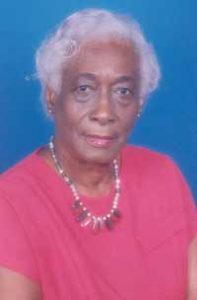
Magda Lois Muriel Pollard a stalwart women’s activist, was fittingly bestowed the honour of the fourth CARICOM Triennial Award for Women in 1993. Throughout her country of birth and the wider Caribbean region, the name Magda Pollard is synonymous with the movement for women’s empowerment and women’s rights. The creation of a liberating and sustaining environment for women is the passion which fuels her lifelong and consistent service in the arena of women’s development.
Ms Pollard commenced her career in the field of Home Economics, pursuing this endeavour and earning the Teacher’s Diploma from the Glasgow and West of Scotland College of Domestic Science, and also gaining prizes as the Best Child Teacher and for Needlework.
She later pursued the Postgraduate Certificate Course at the Queen Elizabeth College, London University, in Home Economics related to Community Development, gaining a distinction.
A significant part of her post university years were spent on return to her home land at the Carnegie School of Home Economics as both lecturer and Principal. With boldness, she accepted the challenge of spearheading the development of a programme for women within CARICOM. Her appointment as the first Women’s Affairs Officer at the CARICOM Secretariat opened vast opportunities for her to impact the lives, not only of Guyanese women, but women throughout the Region. The many initiatives and programmes that emanated from the Women’s Desk gave impetus to the process of gender mainstreaming within CARICOM and set the agenda for the integration of actions and policies to benefit women in regional programmes.
Ms. Pollard’s invaluable contribution to women’s development in the Caribbean captured regional attention and earned her several honours and awards in addition to the CARICOM Triennial Award. She has received the 1992 CARIFESTA Award for Women, two national awards, the Cacique Crown of Honour and the Golden Arrowed of Achievement as well as the special award of the Caribbean Association of Home Economists of which she was a founding member.
Her career of service extends to membership of various commissions and bodies with women’s welfare as the primary goal and she is currently Chairperson of the Guyana National Commission on Women. Ms. Pollard was at the helm of a regional project to prepare model legislation for the removal of all forms of discrimination against women which addressed rights of citizenship, inheritance, domestic violence and sexual offences. Significant hallmarks of her career included her contribution to the establishment of focal points in government departments to address the issue of the advancement of women. During her tenure she organised for the creation of Women’s Bureaus in the OECS. Ms. Pollard spearheaded a three-year programme – Management for Development: Effecting Change whose target included senior women administrators. Her illustrious career spans participation in the emerging network among UN specialised agencies, representation at various regional and UN Fora; and the creation of inroads in strengthening relations between governments and non-governmental organisations. She has to her credit two publications on Home Economics which she has co-authored.
A woman of grace and dignity, Magda Pollard is highly regarded by her peers and the wider community. Her continued active engagement in work to raise the level of consciousness about the status of women and to engender necessary reform attests to a deep and unswerving life commitment to creating a better environment within which women would live.
JUNE RAMSAMMY
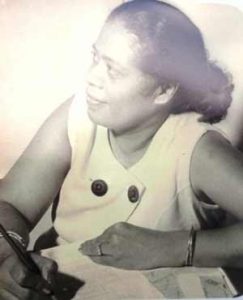
A humble woman who blazed a trail for many women in Guyana, the late June Ramsammy quietly bore the banner of the “first” woman in Guyana to be appointed in a number of prominent positions in both her private and professional life.
She was the first female Head of Human Resources in Banks DIH, one of Guyana’s major employers where she had responsibility for one thousand, five hundred (1,500) employees.
She was a founder member of the Business and Professional Women’s Club of Guyana. She was the first female Personnel Manager at the Guyana Graphic newspaper in the late 1950s and the early 1960s and the first woman to sit on the Labour Board of Guyana.
One of the first women to be accepted into the Rotary Club of Guyana, June eventually earned the coveted Rotary recognition of service with the title of Paul Harris Fellow conferred on her; an honour awarded as a tribute to a Rotarian whose life demonstrates a shared purpose with the objectives of the Rotary Foundation and as appreciation for contribution to the Rotary’s humanitarian and educational programmes.
A devout Anglican she was the first to represent her church on the Diocesan Synod and to serve on its Board of Trustees. June was also a member of the Church Committee of t. Aloysius Anglican Chapel and was keenly involved with the Anglican diocese youth culture.
In her formative years, June Ramsammy started out in a teaching career and completed a course in Secretarial Studies before undergoing formal training in Personnel Management and Industrial Relations, graduating with a Diploma. She attended several Advanced Courses in Personnel Training in t. Lucia, Grenada, St. Kitts, Puerto Rico and Barbados.
She was a facilitator and participant at several local forums. At an international Breweries Convention, held in Guyana, she presented a paper titled, “Employees as an investment Asset”, and at a similar Convention in Puerto Rico, gave a presentation titled “Labour Relation in the Caribbean”.
Her life of service to both state and the civil society was exemplified in the number of corporate and voluntary organisation in which she was actively involved. A sampler of these included in the Arbitration tribunal of the Guyana Electricity Corporation on two occasions under the chairmanship of Justice Prem Persaud and Justice Lori Ganpatsingh respectively. She was a committee member of the councils of the Ministry of Labour, Human Services and Social Security and the Consultation Association of Guyanese Industries (CAGI). She was also actively involved in the Mildred Marshfield Youth Club Board.
June Ramsammy deftly and convincingly broke the proverbial glass ceiling for women in the corporate sector here and stands as a role model for generations of business and professional women that followed in her wake.
ALICE MUNRO
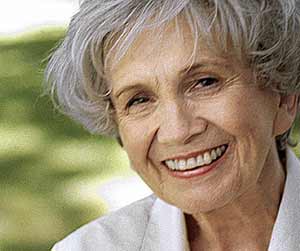
Alice Ann Munro born on July 10, 1931 and is a Canadian author whose work, written in English has been described as having revolutionised the architecture of short stories, and she is regarded as “one of our greatest contemporary writers of fiction”. Her work has been compared to Anton Chekov and in 2013 she was awarded the 2013 Nobel Prize in Literature for her work as “master of the contemporary short story”. She had previously won the 2009 Man Booker International Prize for her lifetime body of work, and is also a three-time winner of Canada’s Governor General’s Award for fiction. She is the first Canadian and the 13th woman to receive the Nobel Prize in Literature.
Munro’s fiction is most often set in her native Huron County in southwestern Ontario. Her stories explore human complexities in an uncomplicated prose style.
Early life
Munro was born Alice Ann Laidlaw in Wingham, Ontario to a father, Robert Eric Laidlaw, who was a fox and mink farmer and her mother, Anne Clarke Laidlaw née Chamney) a schoolteacher. Munro began writing as a teenager, publishing her first story, “The Dimensions of a Shadow,” in 1950 while studying English and journalism at the University of Western Ontario under a two-year scholarship. During this period she worked as a waitress, a tobacco picker, and a library clerk. In 1951, she left the university, where she had been majoring in English since 1949, to marry fellow student James Munro. They moved to Dundarave, West Vancouver, for James’s job in a department store. In 1963, the couple moved to Victoria, where they opened Munro’s Books, which still operates.
Career
Munro’s highly acclaimed first collection of stories, Dance of the Happy Shades (1968), won the Governor General’s Award, Canada’s highest literary prize. That success was followed by Lives of Girls and Women (1971), a collection of interlinked stories. In 1978, Munro’s collection of interlinked stories Who Do You Think You Are? was published (titled The Beggar Maid: Stories of Flo and Rose in the United States). This book earned Munro a second Governor General’s Literary Award. From 1979 to 1982, she toured Australia, China and Scandinavia for public appearances and readings. In 1980 Munro held the position of writer in residence at both the University of British Columbia and the University of Queensland. In 2006, Munro’s story “The Bear Came Over the Mountain” was adapted for the screen and directed by Sarah Polley as Away from Her, starring Julie Christie and Gordon Pinsent.
Since the 1980s, Munro has published a short-story collection at least once every four years, most recently in 2001, 2004, 2006, 2009, and 2012. First versions of Munro’s stories have appeared in journals such as The New Yorker, The Atlantic Monthly, Grand Street, Harper’s Magazine, Mademoiselle, and The Paris Review. Her collections have been translated into thirteen languages.
TAWAKKOL ABDEL-SALAM KARMAN

Tawakkol Abdel-Salam Karman, is a Yemeni journalist, politician and senior member of the Al-Islah political party, and human rights activist. She leads the group “Women Journalists Without Chains,” which she co-founded in 2005. She became the international public face of the 2011 Yemeni uprising that is part of the Arab Spring uprisings. She has been called the “Iron Woman” and “Mother of the Revolution” by Yemenis. She is a co-recipient of the 2011 Nobel Peace Prize, becoming the first Yemeni, the first Arab woman, and the second Muslim woman to win a Nobel Prize and the youngest Nobel Peace Laureate to date.
Karman gained prominence in her country after 2005 in her roles as a Yemeni journalist and an advocate for a mobile phone news service denied a license in 2007, after which she led protests for press freedom. She organised weekly protests after May 2007 expanding the issues for reform. She redirected the Yemeni protests to support the “Jasmine Revolution,” as she calls the Arab Spring, after the Tunisian people overthrew the government of Zine El Abidine Ben Ali in January 2011.
Tawakkol Karman was born on 7 February 1979 in Mekhlaf, Ta’izz province, Yemen. She is married to Mohammed al-Nahmi and is the mother of three children.
Karman earned an undergraduate degree in commerce from the University of Science and Technology, Sana’a, a graduate degree in political science from the University of Sana’a. In 2012, she received an Honorary Doctorate in International Law from University of Alberta in Canada.
Women Journalists Without Chains (WJWC) with seven other female journalists in 2005 in order to promote human rights, “particularly freedom of opinion and expression, and democratic rights.” Although it was founded as “Female Reporters without Borders,” the present name was adopted in order to get a government license.
Tawakkol Karman was affiliated with the Al-Thawrah newspaper at the time she founded WJWC in March 2005. She is also a member of the Yemeni Journalists’ Syndicate.
RIGOBERTA MENCHU
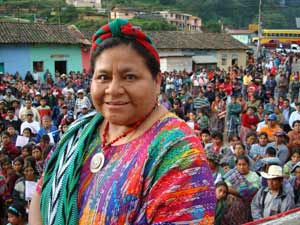
Rigoberta Menchú is an indigenous Guatemalan woman, who has dedicated her life to publicising the plight of Guatemala’s indigenous peoples during and after the Guatemalan Civil War (1960–1996), and to promoting indigenous rights in the country. She received the 1992 Nobel Peace Prize and Prince of Asturias Award in 1998. She is the subject of the testimonial biography I, Rigoberta Menchú (1983) and the author of the autobiographical work, Crossing Borders.
Menchú is a UNESCO Goodwill Ambassador. She has also become a figure in indigenous political parties and ran for President of Guatemala in 2007 and 2011.
Rigoberta Menchú was born to a poor indigenous family of K’iche’ descent near Laj Chimel, a small town in the north-central Guatemalan province of El Quiché. After leaving school, she worked as an activist campaigning against human rights violations committed by the Guatemalan armed forces during the country’s civil war, which lasted from 1960 to 1996.
In 1981, Rigoberta Menchú was exiled and escaped to Mexico. In 1982, she narrated a book about her life to Venezuelan author and anthropologist Elizabeth Burgos, “Me llamo Rigoberta Menchú y así me nació la conciencia” (My Name is Rigoberta Menchu and this is how my Conscience was Born), which was translated into five other languages including English and French. The book made her an international icon at the time of the on-going conflict in Guatemala.
Since the Guatemalan Civil War ended, Menchú has campaigned to have members of the Guatemalan political and military establishment tried in Spanish courts. On 23 December 2006, Spain called for the extradition from Guatemala of seven former members of Guatemala’s government on charges of genocide and torture. Spain’s highest court ruled that cases of genocide committed abroad could be judged in Spain, even if no Spanish citizens have been involved. In addition to the deaths of Spanish citizens, the most serious charges include genocide against the Mayan people of Guatemala.
Menchú has become involved in the Indian pharmaceutical industry as president of the company Salud para Todos (“Health for All”) and the company “Farmacias Similares”, with the goal of offering low-cost generic medicines. She served as presidential goodwill ambassador for the 1996 peace accords.
In 2006, Menchú was one of the founders of the Nobel Women’s Initiative along with sister Nobel Peace Laureates Jody Williams, Shirin Ebadi, Wangari Maathai, Betty Williams and Mairead Corrigan Maguire. Six women representing North America and South America, Europe, the Middle East and Africa decided to bring together their experiences in a united effort for peace with justice and equality. It is the goal of the Nobel Women’s Initiative to help strengthen work being done in support of women’s rights around the world.
She is a member of PeaceJam, an organisation whose mission is “to create young leaders committed to positive change in themselves, their communities and the world through the inspiration of Nobel Peace Laureates who pass on the spirit, skills, and wisdom they embody.”
Rigoberta Menchú is also a member of the Foundation Chirac’s honour committee, ever since the foundation was launched in 2008 by former French President Jacques Chirac in order to promote world peace.
In 2007, Menchú announced that she would form an indigenous political party called Encuentro por Guatemala and that she would stand in the 2007 presidential election. Had she been elected, she would have become Latin America’s fourth indigenous president after Mexico’s Benito Juárez, Peru’s Alejandro Toledo and Bolivia’s Evo Morales.
In 2009 she was involved in the newly founded party Winaq. Menchú was a candidate for the 2011 presidential election, but lost in the first round.
CHIMAMANDA ADICHE
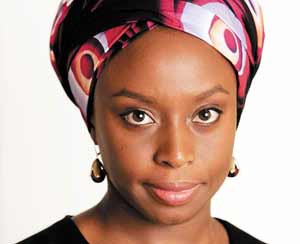
Chimamanda Ngozi Adichie (born 15 September 1977) is a writer from Nigeria. She has been called “the most prominent” of a “procession of critically acclaimed young anglophone authors [that] is succeeding in attracting a new generation of readers to African literature”.
Born in the city of Enugu, she grew up in the university town of Nsukka in south-eastern Nigeria, where the University of Nigeria is situated. While she was growing up, her father James Nwoye Adichie was a professor of statistics at the university, and her mother Grace Ifeoma was the university’s first female registrar. Her family’s ancestral village is in Abba in Anambra State.
Adichie studied medicine and pharmacy at the University of Nigeria for a year and a half. During this period, she edited The Compass, a magazine run by the university’s Catholic medical students. At the age of 19, Adichie left Nigeria and moved to the United States for college. After studying communications and political science at Drexel University in Philadelphia, she transferred to Eastern Connecticut State University to live closer to her sister, who had a medical practice in Coventry. She received a bachelor’s degree from Eastern, where she graduated Summa Cum Laude in 2001.
In 2003, she completed a master’s degree in creative writing at Johns Hopkins University. In 2008, she received a Master of Arts in African studies from Yale University.
Adichie was a Hodder fellow at Princeton University during the 2005–2006 academic year. In 2008 she was awarded a MacArthur Fellowship. She has also been awarded a 2011–2012 fellowship by the Radcliffe Institute for Advanced Study, Harvard University.
Adichie published a collection of poems in 1997 (Decisions) and a play (For Love of Biafra) in 1998. She was shortlisted in 2002 for the Prize for her short story “You in America”.
In 2003, her story “That Harmattan Morning” was selected as joint winner of the BBC Short Story Awards, and she won the O. Henry prize for “The American Embassy”. She also won the David T. Wong International Short Story Prize 2002/2003 (PEN Center Award) and a 2007 Beyond Margins Award for her short story “Half of a Yellow Sun”.
Her first novel, Purple Hibiscus (2003), received wide critical acclaim; it was shortlisted for the Orange Prize for Fiction (2004) and was awarded the Commonwealth Writers’ Prize for Best First Book (2005).
Her second novel, Half of a Yellow Sun, named after the flag of the short-lived nation of Biafra, is set before and during the Biafran War. It was awarded the 2007 Orange Prize for Fiction. Half of a Yellow Sun has been adapted into a film starring Academy Award nominee Chiwetel Ejiofor and BAFTA award winner Thandie Newton and is set for release in 2014. Her third book, The Thing around Your Neck (2009), is a collection of short stories.
In 2010 she was listed among the authors of The New Yorkers “20 Under 40” Fiction Issue. Adichie’s story, “Ceiling”, was included in the 2011 edition of The Best American Short Stories.
In 2013 she published her third novel, Americanah which was selected by the New York Times as one of The 10 Best Books of 2013.
Adichie spoke on “The Danger of a Single Story” for TED in 2009. On 15 March 2012, she delivered the “Connecting Cultures” Commonwealth Lecture 2012 at the Guildhall, London. Adichie also spoke on being a feminist for TED. Huston in December 2012, with her speech entitled, “We should all be feminists” This speech was sampled for the 2013 song “***Flawless” by American performer Beyoncé, where it attracted further attention.
Adichie, who is married, divides her time between Nigeria, where she teaches writing workshops, and the United States.
ARUNDHATI ROY
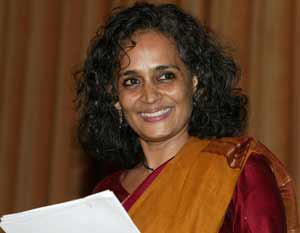
Suzanna Arundhati Roy is an Indian author and political activist who is best known for the 1998 Man Booker Prize for Fiction-winning novel The God of Small Things (1997) and for her involvement in human rights and environmental causes. Roy’s novel became the biggest-selling book by a non-expatriate Indian author.
Early life and background
Arundhati Roy was born in Shillong, Meghalaya, India, to Rajib Roy, a Bengali Hindu tea plantation manager from Calcutta and Mary Roy, a Malayali Syrian Christian women’s rights activist from Kerala. When she was two, her parents divorced and she returned with her mother and brother to Kerala. For a time, the family lived with Roy’s maternal grandfather in Ooty, Tamil Nadu. When she was 5, the family moved back to Kerala, where her mother started a school.
Roy attended school at Corpus Christi, Kottayam, followed by the Lawrence School, Lovedale, in Nilgiris, Tamil Nadu. She then studied architecture at the School of Planning and Architecture, Delhi, where she met architect Gerard da Cunha. The two lived together in Delhi, and then Goa, before they broke up.
Roy returned to Delhi, where she obtained a position with the National Institute of Urban Affairs. In 1984 she met independent filmmaker Pradip Krishen, who offered her a role as a goatherd in his award-winning movie Massey Sahib. The two later married. They collaborated on a television series on India’s independence movement and on two films, Annie and Electric Moon. Disenchanted with the film world, Roy worked various jobs, including running aerobics classes. Roy and Krishen eventually split up. She became financially secure by the success of her novel The God of Small Things, published in 1997.
Early career: screenplays
Roy attracted attention in 1994, when she criticised Shekhar Kapur’s film Bandit Queen, based on the life of Phoolan Devi. In her film review entitled, “The Great Indian Rape Trick”, she questioned the right to “restage the rape of a living woman without her permission,” and charged Kapur with exploiting Devi and misrepresenting both her life and its meaning.
The God of Small Things
Roy began writing her first novel, The God of Small Things, in 1992, completing it in 1996. The book is semi-autobiographical and a major part captures her childhood experiences in Aymanam.
The publication of The God of Small Things catapulted Roy to international fame. It received the 1997 Booker Prize for Fiction and was listed as one of the New York Times Notable Books of the Year for 1997. It reached fourth position on the New York Times Bestsellers list for Independent Fiction. From the beginning, the book was also a commercial success: Roy received half a million pounds as an advance; it was published in May, and the book had been sold to eighteen countries by the end of June.
Later career
Since the success of her novel, Roy has written a television serial, The Banyan Tree, and the documentary DAM/AGE: A Film with Arundhati Roy (2002).
Awards
Arundhati Roy was awarded the 1997 Booker Prize for her novel The God of Small Things. The award carried a prize of about US$30,000 and a citation that noted, “The book keeps all the promises that it makes.” Prior to this, she won the National Film Award for Best Screenplay in 1989, for the screenplay of In Which Annie Gives It Those Ones, in which she captured the anguish among the students prevailing in professional institutions.
In 2002, she won the Lannan Foundation’s Cultural Freedom Award for her work “about civil societies that are adversely affected by the world’s most powerful governments and corporations,” in order “to celebrate her life and her ongoing work in the struggle for freedom, justice and cultural diversity.”
In 2003, she was awarded ‘special recognition’ as a Woman of Peace at the Global Exchange Human Rights Awards in San Francisco with Bianca Jagger, Barbara Lee and Kathy Kelly.
Roy was awarded the Sydney Peace Prize in May 2004 for her work in social campaigns and her advocacy of non-violence.
In January 2006, she was awarded the Sahitya Akademi Award, a national award from India’s Academy of Letters, for her collection of essays on contemporary issues, The Algebra of Infinite Justice, but she declined to accept it “in protest against the Indian Government toeing the US line by ‘violently and ruthlessly pursuing policies of brutalisation of industrial workers, increasing militarization and economic neo-liberalization.’ In November 2011, she was awarded the Norman Mailer Prize for Distinguished Writing.
By Michelle Gonsalves




.png)









